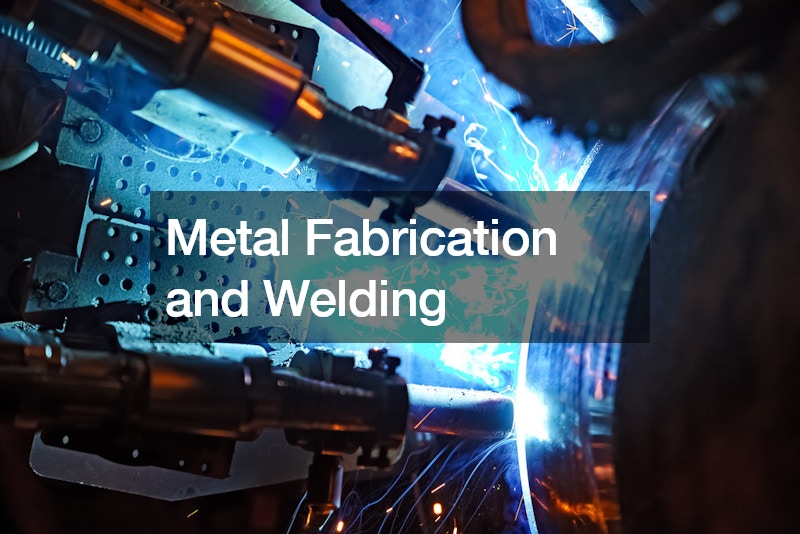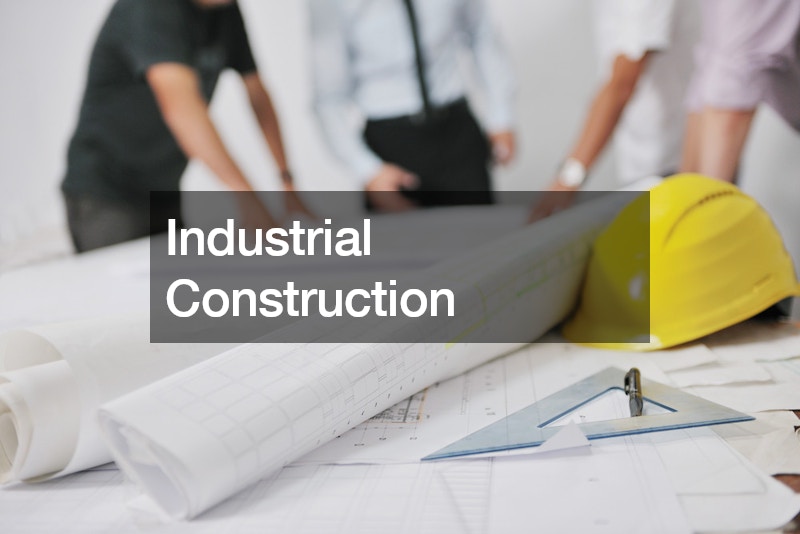The industrial and manufacturing sectors are the backbone of the economy, providing essential goods and services that support various industries and daily life. From raw material processing to advanced technology manufacturing, these businesses play a crucial role in innovation and economic growth. Here’s a comprehensive look at ten types of industrial and manufacturing businesses you should know about, highlighting their importance and the unique services they offer.
1. Metal Fabrication and Welding

Metal fabrication and welding are critical in many industrial applications, from constructing buildings and bridges to creating machinery and tools. Metal fabrication involves cutting, bending, and assembling metal parts, while welding joins these parts together to create a final product.
Welding Apprenticeship Programs
The demand for skilled welders is high, making welding apprenticeship programs essential for training the next generation of professionals. These programs provide hands-on experience and theoretical knowledge, ensuring that welders are proficient in various techniques and safety standards. Many industries, including automotive, construction, and aerospace, rely heavily on skilled welders to maintain high-quality standards in their products.
2. Industrial Cleaning and Maintenance
Industrial cleaning and maintenance businesses provide essential services to keep manufacturing plants and industrial facilities clean, safe, and operational. These services include cleaning machinery, floors, and other surfaces using specialized industrial cleaning chemicals designed to handle tough residues and contaminants.
Importance of Industrial Cleaning Chemicals
Industrial cleaning chemicals are formulated to effectively remove grease, oil, dirt, and other stubborn contaminants from equipment and surfaces. These chemicals help maintain the efficiency and longevity of machinery, reduce the risk of breakdowns, and ensure a safe working environment. Regular cleaning and maintenance are crucial for preventing costly repairs and downtime in industrial operations.
3. Electrical Services and Panel Replacement

Electrical services are vital for the installation, maintenance, and repair of electrical systems in industrial and manufacturing facilities. This includes wiring, lighting, and power distribution systems that keep operations running smoothly.
Electrical Panel Replacement
Over time, electrical panels can become outdated or damaged, posing safety risks and reducing efficiency. Electrical panel replacement is a critical service provided by electricians to ensure that electrical systems are up to code and capable of handling the power demands of modern equipment. Upgrading electrical panels improves safety, prevents electrical fires, and enhances the overall performance of the electrical system.
4. Custom Manufacturing
Custom manufacturing businesses create specialized products tailored to specific client needs. These businesses often work closely with clients to design and produce unique items that meet precise specifications.
Custom Golf Cart Seat Manufacturer
A custom golf cart seat manufacturer, for instance, designs and produces seats tailored to the specific requirements of golf cart owners and manufacturers. These seats can be customized for comfort, style, and durability, enhancing the overall experience of using a golf cart. Custom manufacturing businesses like these play a crucial role in providing personalized solutions that meet the unique needs of various industries.
5. Plastic and Injection Molding
Plastic and injection molding businesses produce a wide range of plastic products used in numerous industries, from automotive parts to consumer goods. Injection molding involves injecting molten plastic into molds to create specific shapes and sizes.
Plastic Preform Production
One significant aspect of plastic manufacturing is the production of plastic preforms, which are used to create bottles and containers. A plastic preform is molded into its initial shape and then blown into the final product. This process is essential for producing a variety of plastic products efficiently and consistently. Plastic and injection molding businesses are crucial for supplying high-quality plastic components to various industries.
6. Industrial Construction

Industrial construction businesses specialize in building and maintaining industrial facilities such as factories, warehouses, and power plants. These projects require specialized knowledge and skills to ensure that the structures meet industry standards and can support complex industrial operations.
Role of Industrial Contractors
Industrial Contractors play a vital role in managing and executing construction projects for industrial facilities. They oversee the entire construction process, from planning and design to construction and maintenance. Their expertise ensures that projects are completed on time, within budget, and to the highest quality standards. Industrial contractors are essential for developing the infrastructure needed to support industrial growth and innovation.
7. Glass and Glazing Services
Glass and glazing businesses provide essential services for installing and maintaining glass in various settings, including commercial buildings and residential properties.
Glass Shower Enclosure Installs
One popular service offered by glass and glazing businesses is glass shower enclosure installs. These enclosures add a modern and elegant touch to bathrooms, providing a sleek and functional design. Proper installation is crucial for ensuring that the enclosures are watertight and durable. Glass and glazing services also include the installation of windows, doors, and other glass features in commercial and residential buildings.
8. Surface Preparation and Coating
Surface preparation and coating businesses specialize in preparing surfaces for painting, coating, or finishing. These services are essential for ensuring that surfaces are clean, smooth, and ready for the next stage of production.
Sandblasting Services
Sandblasting services are a common method of surface preparation, involving the use of high-pressure air and abrasive materials to clean and smooth surfaces. This process is crucial for removing rust, paint, and other contaminants from metal, wood, and other materials. Sandblasting provides a clean and even surface, ensuring that coatings adhere properly and last longer. Surface preparation and coating businesses play a vital role in maintaining the quality and durability of finished products.
9. Door and Hardware Manufacturing

Door and hardware manufacturing businesses produce a wide range of products used in commercial and residential properties, including doors, frames, locks, and other hardware components.
Commercial Door Hardware
Commercial door hardware is an essential aspect of building security and functionality. This includes locks, handles, hinges, and other components that ensure doors operate smoothly and securely. Door and hardware manufacturers provide high-quality products that meet safety and security standards, catering to the needs of various industries and building types.
10. Electrical and Electronic Manufacturing
Electrical and electronic manufacturing businesses produce a wide range of products, from household appliances to industrial machinery and equipment. These businesses are critical for providing the components and devices that power modern technology.
Importance of Electricians
Electricians play a crucial role in the installation, maintenance, and repair of electrical systems and equipment. They ensure that electrical systems are safe, efficient, and compliant with regulations. Electrical and electronic manufacturing businesses rely on skilled electricians to keep their operations running smoothly and to address any electrical issues that arise.
Conclusion
Understanding the various types of industrial and manufacturing businesses is essential for appreciating the complexity and diversity of the industry. From welding apprenticeships and custom golf cart seat manufacturers to sandblasting services and commercial door hardware producers, each business plays a vital role in supporting the economy and driving innovation. By recognizing the importance of these businesses, we can better appreciate the products and services they provide and the skilled professionals who make it all possible.
Additional Insights into Industrial and Manufacturing Businesses
The Role of Innovation
Innovation is at the heart of the industrial and manufacturing sectors. Businesses in these industries continually develop new technologies, processes, and products to improve efficiency, reduce costs, and meet evolving customer demands. For example, advancements in automation and robotics have revolutionized manufacturing, allowing for faster production times and higher precision. Embracing innovation is crucial for staying competitive and addressing the challenges of a rapidly changing market.
Sustainability and Environmental Responsibility
Sustainability is becoming increasingly important in the industrial and manufacturing sectors. Businesses are adopting eco-friendly practices to reduce their environmental impact and comply with regulations. This includes using sustainable materials, minimizing waste, and implementing energy-efficient processes. For instance, the production of plastic preforms has seen a shift towards using recycled materials and reducing energy consumption. Sustainable practices not only benefit the environment but also enhance a company’s reputation and can lead to cost savings.
Workforce Development
Skilled labor is essential for the success of industrial and manufacturing businesses. Workforce development initiatives, such as welding apprenticeships and technical training programs, are crucial for cultivating a skilled workforce. These programs provide hands-on training and education, ensuring that workers have the expertise needed to operate complex machinery, perform precision tasks, and adhere to safety standards. Investing in workforce development helps businesses maintain high-quality standards and remain competitive in the global market.
Global Supply Chains
Industrial and manufacturing businesses often operate within complex global supply chains. These supply chains involve sourcing raw materials, manufacturing components, and distributing finished products across various regions. Effective supply chain management is crucial for ensuring timely delivery, maintaining quality, and managing costs. Businesses must navigate challenges such as fluctuating material prices, geopolitical tensions, and transportation logistics to maintain a smooth and efficient supply chain.
Future Trends in Industrial and Manufacturing
As technology continues to evolve, the industrial and manufacturing sectors are poised for significant changes. Here are some trends to watch:
Automation and Robotics
Automation and robotics are transforming manufacturing processes, increasing efficiency, and reducing labor costs. Automated systems can perform repetitive tasks with high precision, allowing human workers to focus on more complex and creative activities. The integration of robotics in manufacturing is expected to grow, leading to more sophisticated and flexible production lines.
Internet of Things (IoT)
The Internet of Things (IoT) is revolutionizing how industrial and manufacturing businesses operate. IoT devices collect and transmit data from machinery, equipment, and processes, providing valuable insights into performance and efficiency. This data can be used to optimize operations, predict maintenance needs, and improve overall productivity. IoT technology enhances connectivity and real-time monitoring, enabling businesses to make data-driven decisions.
Additive Manufacturing (3D Printing)
Additive manufacturing, or 3D printing, is gaining traction in various industries. This technology allows for the creation of complex and customized parts with high precision and minimal waste. 3D printing is particularly beneficial for prototyping, small-batch production, and producing intricate components that would be challenging to manufacture using traditional methods. As the technology advances, it is expected to become more accessible and widely adopted in industrial and manufacturing applications.
Sustainable Manufacturing Practices
Sustainability will continue to be a driving force in the industrial and manufacturing sectors. Businesses are increasingly adopting sustainable practices, such as using renewable energy sources, implementing circular economy principles, and reducing carbon footprints. Sustainable manufacturing not only benefits the environment but also meets the growing consumer demand for eco-friendly products. Companies that prioritize sustainability are likely to gain a competitive advantage and attract environmentally conscious customers.
Challenges Facing Industrial and Manufacturing Businesses
While there are many opportunities for growth and innovation, industrial and manufacturing businesses also face several challenges:
Labor Shortages
The industrial and manufacturing sectors often struggle with labor shortages, particularly in skilled trades. Attracting and retaining qualified workers is a significant challenge, exacerbated by an aging workforce and a lack of interest in manufacturing careers among younger generations. Addressing this issue requires investing in training programs, promoting the benefits of careers in manufacturing, and creating attractive work environments.
Supply Chain Disruptions
Supply chain disruptions, such as those caused by natural disasters, geopolitical conflicts, and pandemics, can significantly impact industrial and manufacturing operations. Businesses must develop resilient supply chain strategies to mitigate risks and ensure continuity. This includes diversifying suppliers, implementing robust contingency plans, and leveraging technology for real-time monitoring and response.
Technological Integration
Integrating new technologies into existing systems can be challenging for industrial and manufacturing businesses. The transition to automation, IoT, and other advanced technologies requires significant investment, employee training, and process adjustments. Businesses must carefully plan and execute technology integration to maximize benefits and minimize disruptions.
Regulatory Compliance
Industrial and manufacturing businesses must navigate a complex landscape of regulations and standards related to safety, environmental protection, and quality control. Compliance with these regulations is essential but can be time-consuming and costly. Staying informed about regulatory changes and implementing effective compliance programs is crucial for avoiding penalties and maintaining a good reputation.
The industrial and manufacturing sectors are diverse and dynamic, encompassing a wide range of businesses that play a vital role in the global economy. From metal fabrication and custom manufacturing to electrical services and surface preparation, each type of business offers unique services and contributes to the overall industrial landscape. Understanding the various types of industrial and manufacturing businesses helps us appreciate their contributions and recognize the importance of innovation, sustainability, and workforce development in driving the industry forward.
As these sectors continue to evolve, embracing new technologies and sustainable practices will be key to overcoming challenges and seizing opportunities for growth. Whether through welding apprenticeship programs, advancements in IoT, or the adoption of 3D printing, industrial and manufacturing businesses are well-positioned to lead the way in shaping the future of industry and technology.

